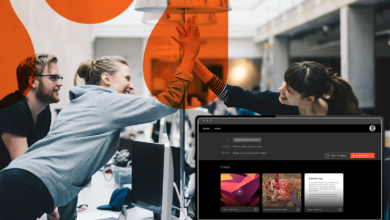Between a shift to mostly remote communications and the urgent need to implement new, non-intuitive tools and processes, creative reviews faced some unusual challenges in 2020—cutting into time and other resources that could be better spent on true creativity and collaboration.
During a recent Henry Stewart Creative Ops webinar sponsored by OpenText Hightail, Liz Meitus, creative director at OpenText, offered several unique tips to help navigate those challenges:
Be careful of defining things – Meitus said that creative professionals often immediately start asking clients questions that can either box in or label a project—rather than taking a wider view of all the possible opportunities available. And while that tactic is suitable for some simpler projects, it can be a hinderance toward creativity in others.
“The second you define something too much or label it, you take away the magic,” she said. “You take away the potential of what it could be.”
She pointed out that even if a project is nearly completed, it’s sometimes worth considering new opportunities to improve it or even “blow it up.”
She added, “And that’s where the excitement and magnetism come in. If you can be brave and bold enough to blow something up or at least take a sharp left turn, not only will the project be better, but the relationships around these projects improves.” She added that doing so gives permission for everyone to think about a project more bravely and authentically and encourages team collaboration.
The need to avoid overly defining things also applies to tools and processes that are being used, according to Meitus. “Tools are great for helping us complete tasks. But if we can improve the process with the tool beyond the initial use case, I’m up for hacking anything.”
Meitus added, “The best part is that teams are constantly changing and business is constantly changing, so don’t just make things work for one moment in time. Keep evaluating and see how it works next week, next month or even next quarter.”
Be like Swiss cheese – Meitus said that it’s also important to “let things pass through you,” as they might through a piece of Swiss cheese. “I know this can be challenging. I’ve seen creative people hold on to things far too long, and I can see how that can make them crumble from the inside out.”
While it can be difficult to see something you’ve built or been a part of “destroyed in any way,” she said that being like Swiss cheese can empower you with a more neutral perspective—less affected by the drama and change that can’t be avoided. “Being like Swiss cheese is magnetic and allows you to enter this new world order without as much effort and far less friction.”
To help you achieve this Swiss cheese-like state, she suggests creating a digital vision board or even a folder on your mobile phone filled with inspirational photos of why you do what you do, including your children, your spouse or a favorite vacation spot. “In times of high stress or when you’re feeling the little things, you can go and spend some time looking at that set of photos.”
Do weird things – “To be interesting, you have to be interested,” Meitus said. “So do random weird things. … Just go ahead and sign up for the class you’re terrified of or seek out odd stuff. It will feed your soul in moments that you least expect the need for it to be fed.”
She added, “I’m not even suggesting that you have to tell people that you’re doing these funny random things. … It can be sacred, and you can avoid the judgment you might think others would have of it. When you do these types of weird things for yourself, you will get to experience life from different angles you will be more magnetic.”
Along those same lines, she suggests also surrounding yourself with people that don’t do what you do and who are different from you.
“Birds of a feather don’t always help you accelerate in your career or in a project,” she said. “Collaborating with people who don’t think like you do ultimately opens your mind to a slew of perspectives that will serve you in the long haul.”
Taking it a step further, she even suggests hiring people that are better at your job than you are. “You really want people that can take over your position, as it helps you stay focused and fresh.”
Daily intentions work – Meitus said she recently got back into the practice of setting an intention each day. “When you stop to spend even 30 seconds defining your intention for your body, your work day and your relationships, I’m telling you: Life is easier.”
She added, “The universe is conspiring to help you, but you first need to tell the universe what you actually want for the day.”
You can even take it a step further by adding accountability to the mix, according to Meitus. She writes hers on her bathroom mirror and also suggests telling a partner, a friend or a colleague each morning—via text, Slack channel, dry erase board or even including it as your status on any of the tools you regularly use. “When you share it with colleagues, they will unconsciously try to help you—and sharing can also ignite more ideas from others.”
Setting intentions can even be done as more than a daily activity, with Meitus saying she has set intentions before pitching a new idea or tool. Some other examples of intentions she shared included:
- I will say thank you to every single person that helps my momentum today, even if it means I send it via text or Teams.
- I’m going to remain grounded and calm during all of my meetings today.
- I’m going to listen to everyone in the room before giving my feedback.
- I’m going to spend one hour learning something new about X tool.
- I’m going to teach three people the vision of a new process and calmly absorb their feedback.
“It could even just be as simple as ‘I’m going to drink eight glasses of water today,’” she said. “Any intention you make is going to help focus your day in some way. … It’s more about the act or the ritual of doing it and taking the time to yourself to evaluate one thing that you need help with today.”
For the rest of the tips and tricks shared during the webinar, you can now watch “From manic to magnetic: How to bring focus to your best creative work” on demand.




